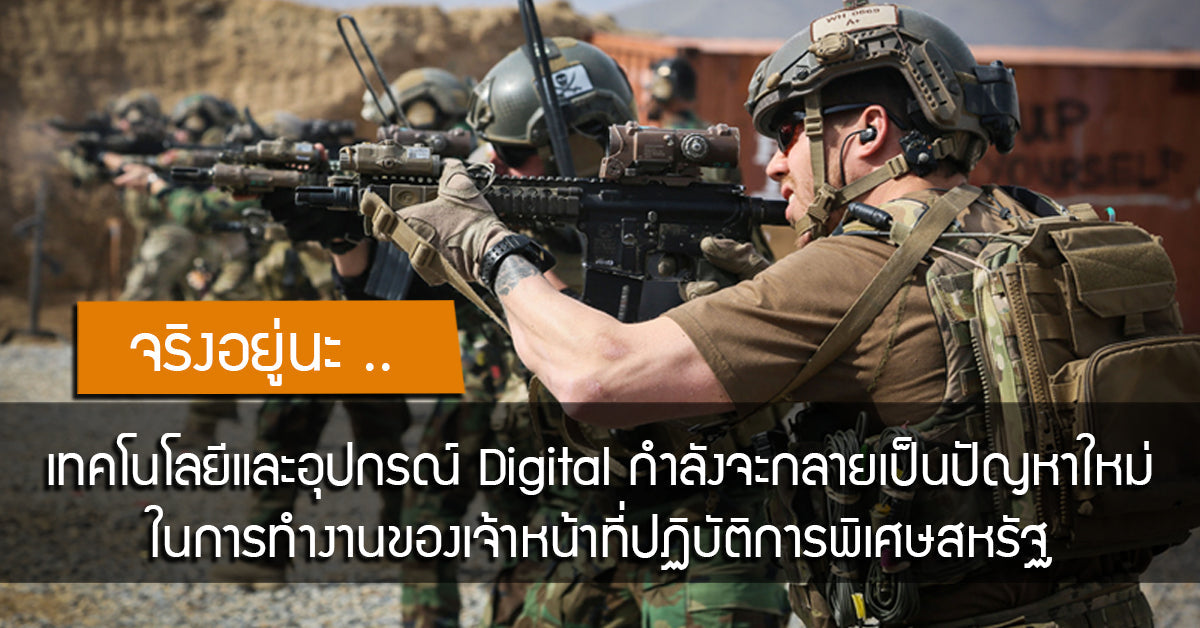There is no denying that it improves people's lives in every aspect.
But it's also a double-edged sword.
Whenever something new comes along, it comes with new vulnerabilities.
And in some cases, the impact is so severe that it is unimaginable.
Over the years ... the US military and intelligence agencies
A variety of data from various missions have been collected.
And one of the really interesting things they discovered was that…

From social media to communication devices
Including various assistive technologies such as Apps
Or a GPS watch for recording exercise results
Of the general personnel on a daily basis that seem so ordinary.
It has now become a key tool for intelligence agencies.
Of military rivals such as China or Russia.
Or even terrorist groups in some areas use it for tracking and searching.
Locations where US military personnel operate around the world are easily accessible.

Whether it's an app for updating your Strava workout history
Extremely popular in the US, to the App and device on the Apple Watch.
Or on any model of Smart Watch, any brand that has GPS recording and is connected.
Compatible with satellite positioning
All of this can allow malicious actors to investigate and find information.
And can predict location, including main routes.
That military officers regularly use easily
And this problem is not limited to the US military; it has implications for
In the same vein, with many world-class special operations units
The latest incident to be publicized is the British SAS special forces unit.
The location of the mission in Syria and Somalia has been revealed.

(Example image of checking Activity through Heat Map function)
Inside the Strava app showing routes inside Bagram Air Base in Afghanistan.
It appeared because a number of people use that route for regular exercise.)
The author once had the opportunity to talk with a special operations officer.
Where they choose to avoid using modern smart watches
And still using a GPS watch that does not require a connection.
Integrate with any online system that they have been using for a long time.
And it is still in use today.
He gave interesting reasons for choosing these watches.
Including avoiding using new models of Smart Watches.
It is very easy to find a stronghold.
or important military positions through these systems
Because it is easy to prevent in the operational areas
Whether it is Iraq, Afghanistan, Syria and Somalia,
It is "extremely difficult" for the average person to have these things.
If you open the app and suddenly see that there is an area
Full of people with expensive GPS watches.
Amidst the areas where most people still have to compete
For food or clothing to survive day to day.
It's almost immediately obvious that the place must be full of Americans.
Yes.. and it's that simple. That's why we
Still wearing just a regular watch that is not connected to any system.
Despite bans, policy changes and requests for cooperation
To help conceal information that could endanger U.S. military personnel.
Stationed overseas, but even so, this is still one of the scary vulnerabilities. 
Even though it may seem like nothing scary, it's actually not like that at all..
If it falls into the wrong hands and decrypts this information,
It will give them a lot of important information through this small data set.
For example… the routes they regularly travel in areas where they feel safe.
to the length of time they regularly come out for running, the number of days they stay at the base
This makes it very easy for ill-wishers to plan and even set up traps for themselves.
From this information ...
And with special operations officers, it's even more dangerous ..
Because even though they are not the ones connected to any device,
But that doesn't mean it's safe from having your data collected through other officials.
Closely related to them, and that's what we found out...
Although most of the information may be displayed in areas we already know about,
It's true that it's a base, but sometimes it ends up in places it shouldn't be.
For example, from spy sites to secret CIA bases.
Who have a history of having their information disclosed through behavioral observation
In this exercise app. 
The harder part is enforcing these regulations, especially in this day and age.
Mobile phones and such have almost become part of the body.
We are in the present era.
One analyst and official within the US intelligence community said:
"Back when I was stationed in 1999, in that era,
Every soldier is only allowed one phone call home per week."
But still.. when they go out to fight on tour 2 and 3, they usually
Mostly experience divorce or family problems.
And that greatly reduces the percentage of people who enlist in the military.
It's not the app's or the developer's fault.
Because in the end, when a problem arises, they are ready to cooperate with us.
To protect the sensitive information of our military and personnel.
But the changing behavior of the workforce is making it harder to keep secrets.
In carrying out military missions (Operation Security: OPSEC)
It's getting harder to do every day... 
Taking a selfie with military vehicles, locations or equipment and
Post it on social media or send it via chat to friends or family.
Including video recordings related to training and check-ins.
When traveling to various locations while stationed overseas
All of these are risk factors that can cause danger to military personnel.
Whether it's active duty soldiers or special operations units ...
Despite the many rules and regulations, some people still make mistakes.
Until there are continuous negative consequences. In this era, fighting is not only on the battlefield.
Only on the ground, in the sky and on the sea. 
But there is also Cyberwarfare where these soldiers could be attacked.
From a group of ill-wishers or perhaps perpetrated by a single insurgent.
Also known as "Lone-Wolf Terrorist Attack", which is a terrifying threat.
In modern and near future warfare
They will collect the data and make it public.
Whether it's a list of names, pictures and various behaviors of military officers
Data is collected through social media usage behavior or the use of accessories.
and many technologies, which are briefly called the "Digital Footprint" of that person.
And the exposed information could lead to harm to the officer and his teammates.
It can even extend to their family members, and that's what
We need to urgently improve data protection and control.
We need to change the behavior of our troops before it's too late. 
Which sometimes... a lot of information doesn't come from social media accounts.
Of the official directly, but came from the account of a close friend.
and the family members that surround them, and that's why.
Where all special operations officers were ordered to reduce
Or stop using social media completely.
And especially with Tier 1 units, they will avoid using it.
Social Media and choose to communicate through special channels
They are highly private and will only contact people they trust very much. 
And even though it seems to have many disadvantages, if you look at it from the other side,
These technologies can also be turned into weapons.
And it became one of their chosen tactics.
In order to collect data to perform the same mission
And this is why Cyberwarfare
To these new information and technologies
It is gaining attention and being introduced as one of the things
Special operations forces around the world are giving it the utmost importance.
In modern warfare....
Source: Electronic Devices Are the New Problem for Special Operators Overseas
Source: Strava fitness tracking app reveals location of military bases - SlashGear
Source: Strava Data Heat Maps Expose Military Base Locations Around the World
Source: Strava Fitness App Can Reveal Military Sites, Analysts Say
Author / Arranged by: Ronnakrit " Viking " Sripumma
On June 8, 2021

